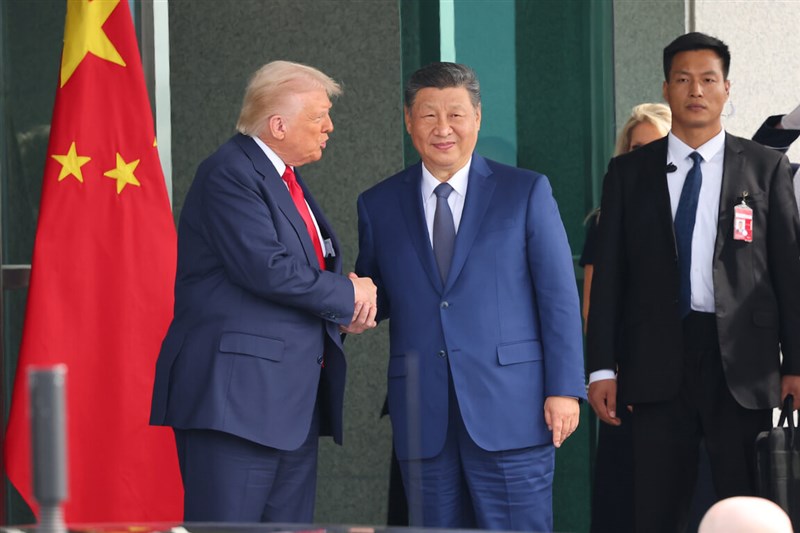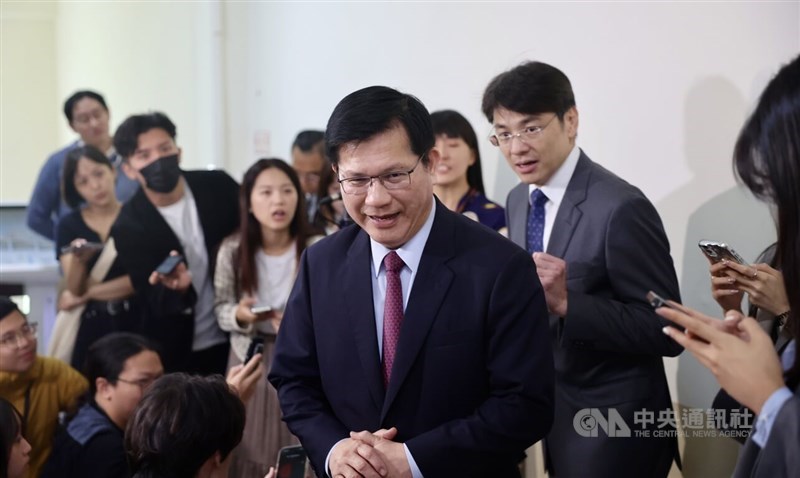
Taipei, Oct. 30 (CNA) United States President Donald Trump said Thursday that Taiwan was not discussed in his meeting with Chinese President Xi Jinping (習近平) in South Korea, the first face-to-face meeting between the two leaders since 2019.
Taiwan "never came up. That was not discussed, actually," Trump said on Air Force One after meeting Xi.
Following the 100-minute meeting in South Korea's Busan earlier Thursday, Trump also confirmed tariffs on Chinese goods exported to the U.S. will be reduced and he will visit Beijing in April.
Meanwhile, a Chinese foreign ministry press release on the same meeting also did not mention Taiwan was among the topics discussed by the two leaders.
China's state-run Xinhua news agency quoted Xi as telling Trump that he will continue to work to build a solid foundation for bilateral ties, and create a sound atmosphere for the development of both countries.
Asked to comment on the meeting after it concluded, Taiwan's Ministry of Foreign Affairs (MOFA) spokesman Hsiao Kuangwei (蕭光偉) told CNA on Thursday afternoon that the ministry is in close communication with Washington on the latest meeting between American and Chinese leaders, without elaborating.

Earlier Thursday, before the Trump-Xi meeting began, Foreign Minister Lin Chia-lung (林佳龍) told reporters on the sidelines of a legislative session that Taiwan is "confident" in its relations with the U.S.
Bilateral ties are based on the Taiwan Relations Act (TRA) and the Six Assurances, and both countries have engaged in close exchanges and cooperation in areas spanning security, economics and trade, technology and culture, Lin added.
Under the "Six Assurances" offered by former U.S. President Ronald Reagan's administration in 1982, the U.S. agreed to not consult with Beijing on arms sales to Taiwan and did not take any position regarding sovereignty over Taiwan. The U.S. also promised it will never pressure Taiwan to negotiate with Beijing.
Meanwhile, the TRA pledges to provide Taiwan with defense articles and services to help Taiwan maintain its self-defense capability. The two are guidelines that govern U.S. exchanges with Taiwan after it cut ties with Taipei in favor of Beijing in 1979.
Before the Thursday meeting took place, opposition party figures in Taiwan expressed concerns Taiwan would be used as a bargaining chip in the ongoing U.S.-China trade talks.
In rebutting such allegations, U.S. Secretary of State Marco Rubio said Sunday that Taiwan does not need be concerned about such a possibility.
"I don't think you're going to see some trade deal where, if what people are worried about is, we're going to get some trade deal or we're going to get favorable treatment on trade in exchange for walking away from Taiwan," Rubio told reporters aboard his airplane as it traveled between Israel and Qatar en route to Asia.
"No one is contemplating that," Rubio said, according to a Reuters report.
-
Politics
Lawmaker released on NT$1 million bail amid multiple probes
02/13/2026 10:05 PM -
Society
Taiwan allows import of spinal cords from U.S. cattle 30 months or younger
02/13/2026 09:59 PM -
Business
1,811 industrial products exempt from U.S. tariffs: Economics minister
02/13/2026 08:56 PM -
Society
Taoyuan airport braces for record daily passenger traffic as LNY starts
02/13/2026 08:35 PM -
Business
Taiwan's pig farmers urge enactment of bills to enforce origin labels
02/13/2026 08:32 PM